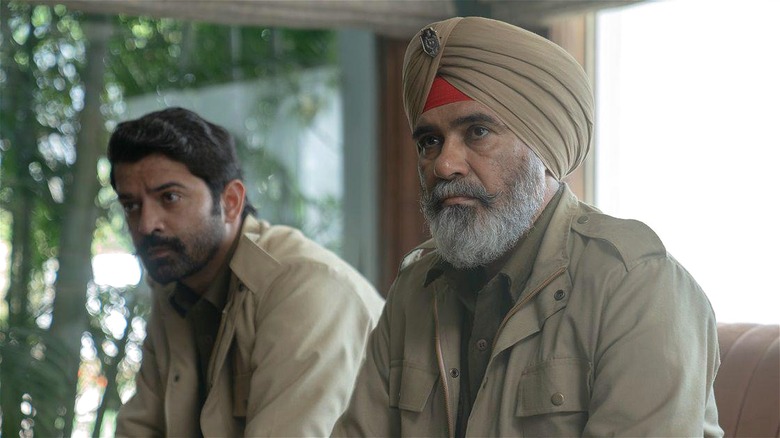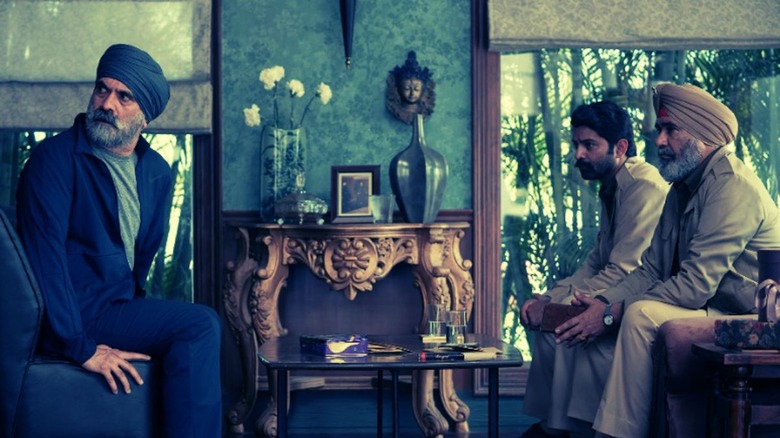Kohrra Is An Indian Noir Series – And The Latest Hit For Netflix
This post contains slight spoilers for Netflix's "Kohrra."
Over the years, Indian crime thrillers or procedural-centered dramas on Netflix have performed really well, appealing to global audiences with their layered take on institutional efficiency and our understanding of how these systems work. Examples such as "Sacred Games" and "Pataal Lok" come to mind, and following this trend of complex, subversive entries in the genre is "Kohrra" (roughly translated to "fog"), which is currently topping Netflix India charts and is ranked pretty high in the Top 10 across South Asia and the Middle East (via Variety). Despite the crime procedural genre being oversaturated at this point, "Kohrra" manages to take specific tropes and subvert them thoroughly, especially when it comes to the portrayal of hegemonic politics of the "romance in the mustard field" trope.
"Kohrra" opens with a murder in a field, where a layer of dense fog hangs over the scene. The death of a man who was about to get married in a few days shifts focus on the fraught, interpersonal relationships that he shared with those he loved, and raises questions about how far one is willing to go in the name of such intense emotions. This six-episode series unravels the mystery in slow-burn, yet intense fashion, and director Randeep Jha ("Trial by Fire") dives into an interconnected web of crime and passion by using an investigative structure that exposes the rot and dysfunction at the heart of these circles.
Emotions are central to "Kohrra," as the inability to reign them in leads to extreme acts, to the point that losing control is the only way to move forward. The procedural side of things does not look rosy either, as the death of Paul (Vishal Handa) unravels threads of warring motivations, including that of prime suspect Sakaar (Saurav Khurana).
An honest, unflinching portrayal of emotions
The series doesn't waste time in exposing the seedy underbelly of crime, where contract killers and shady gangsters run amock and unchecked, while also sealing their fates by choosing a life of no respite. Even those who are not necessarily tied to crime launch into vitriolic tirades that sting enough to incapacitate one emotionally, and go about inflicting the same hurt that they nurse deep within them.
The two policemen who are meant to solve the mystery at hand are more than what their uniforms dictate them to do — Balbir (Suvinder Vicky) and Amarpal (Barun Sobti) often share existential doubts with one another despite sharing contrarian worldviews and ambitions. While Balbir tends to be more calm and cynical, Amarpal leads with emotion, namely grit, and anger.
Moreover, here, love is not an emotion that exists in a dreamy bubble, but a visceral bond between two or more people that mutates under the pressure of class-based discrimination and heteronormative expressions of sexuality. The problematic perception of gender roles in a traditional relationship mars the very concept of love, which is either commodified or uneven, bursting into violence, both physical and emotional. This turns love from a source of solace into something intrinsically terrifying.
Another key subversion that "Kohrra" pulls off is its honest, grounded representation of Punjab and its socio-political climate, which has always been traditionally etched in overly cheerful and over-the-top tones. The romance in the mustard field trope takes on a terrifying tint in the opening scene, where the line between love and aggression is thinned, while violence rears its ugly head right after. Culture-specific issues of hypermasculinity, drug abuse, and patriarchal trauma are also explored in vivid, nuanced detail, making "Kohrra" a must-watch.
"Kohhra" is currently streaming on Netflix.

